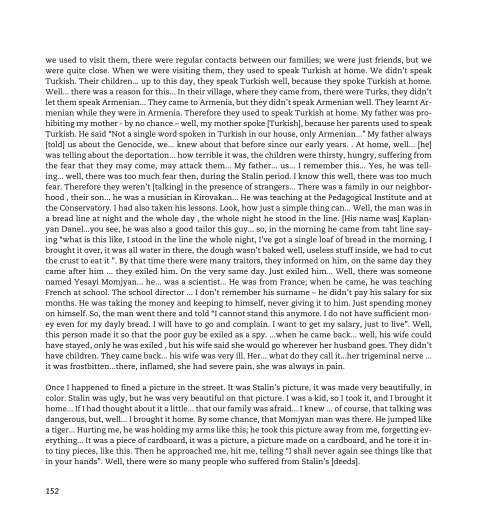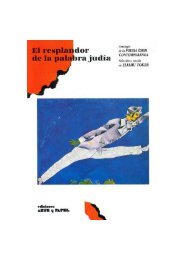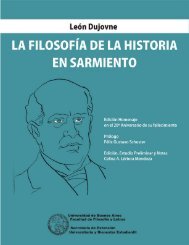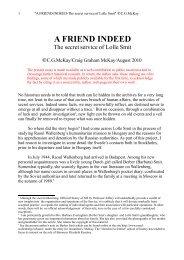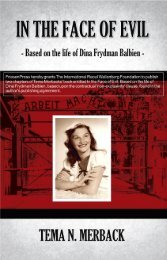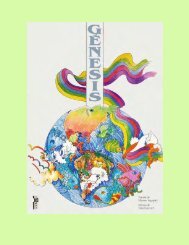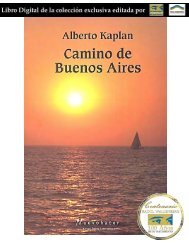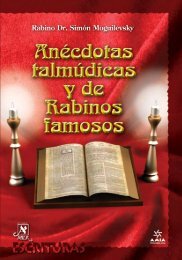Speaking to One Another - The International Raoul Wallenberg ...
Speaking to One Another - The International Raoul Wallenberg ...
Speaking to One Another - The International Raoul Wallenberg ...
- No tags were found...
Create successful ePaper yourself
Turn your PDF publications into a flip-book with our unique Google optimized e-Paper software.
we used <strong>to</strong> visit them, there were regular contacts between our families; we were just friends, but wewere quite close. When we were visiting them, they used <strong>to</strong> speak Turkish at home. We didn’t speakTurkish. <strong>The</strong>ir children... up <strong>to</strong> this day, they speak Turkish well, because they spoke Turkish at home.Well... there was a reason for this... In their village, where they came from, there were Turks, they didn’tlet them speak Armenian... <strong>The</strong>y came <strong>to</strong> Armenia, but they didn’t speak Armenian well. <strong>The</strong>y learnt Armenianwhile they were in Armenia. <strong>The</strong>refore they used <strong>to</strong> speak Turkish at home. My father was prohibitingmy mother - by no chance – well, my mother spoke [Turkish], because her parents used <strong>to</strong> speakTurkish. He said “Not a single word spoken in Turkish in our house, only Armenian...” My father always[<strong>to</strong>ld] us about the Genocide, we... knew about that before since our early years. . At home, well... [he]was telling about the deportation... how terrible it was, the children were thirsty, hungry, suffering fromthe fear that they may come, may attack them... My father... us... I remember this... Yes, he was telling...well, there was <strong>to</strong>o much fear then, during the Stalin period. I know this well, there was <strong>to</strong>o muchfear. <strong>The</strong>refore they weren’t [talking] in the presence of strangers... <strong>The</strong>re was a family in our neighborhood, their son... he was a musician in Kirovakan... He was teaching at the Pedagogical Institute and atthe Conserva<strong>to</strong>ry. I had also taken his lessons. Look, how just a simple thing can... Well, the man was ina bread line at night and the whole day , the whole night he s<strong>to</strong>od in the line. [His name was] KaplanyanDanel...you see, he was also a good tailor this guy... so, in the morning he came from taht line saying“what is this like, I s<strong>to</strong>od in the line the whole night, I’ve got a single loaf of bread in the morning, Ibrought it over, it was all water in there, the dough wasn’t baked well, useless stuff inside, we had <strong>to</strong> cutthe crust <strong>to</strong> eat it ”. By that time there were many trai<strong>to</strong>rs, they informed on him, on the same day theycame after him ... they exiled him. On the very same day. Just exiled him... Well, there was someonenamed Yesayi Momjyan... he... was a scientist... He was from France; when he came, he was teachingFrench at school. <strong>The</strong> school direc<strong>to</strong>r ... I don’t remember his surname – he didn’t pay his salary for sixmonths. He was taking the money and keeping <strong>to</strong> himself, never giving it <strong>to</strong> him. Just spending moneyon himself. So, the man went there and <strong>to</strong>ld “I cannot stand this anymore. I do not have sufficient moneyeven for my dayly bread. I will have <strong>to</strong> go and complain. I want <strong>to</strong> get my salary, just <strong>to</strong> live”. Well,this person made it so that the poor guy be exiled as a spy. ...when he came back... well, his wife couldhave stayed, only he was exiled , but his wife said she would go wherever her husband goes. <strong>The</strong>y didn’thave children. <strong>The</strong>y came back... his wife was very ill. Her... what do they call it...her trigeminal nerve ...it was frostbitten...there, inflamed, she had severe pain, she was always in pain.Once I happened <strong>to</strong> fined a picture in the street. It was Stalin’s picture, it was made very beautifully, incolor. Stalin was ugly, but he was very beautiful on that picture. I was a kid, so I <strong>to</strong>ok it, and I brought ithome... If I had thought about it a little... that our family was afraid... I knew ... of course, that talking wasdangerous, but, well... I brought it home. By some chance, that Momjyan man was there. He jumped likea tiger... Hurting me, he was holding my arms like this; he <strong>to</strong>ok this picture away from me, forgetting everything...It was a piece of cardboard, it was a picture, a picture made on a cardboard, and he <strong>to</strong>re it in<strong>to</strong>tiny pieces, like this. <strong>The</strong>n he approached me, hit me, telling “I shall never again see things like thatin your hands”. Well, there were so many people who suffered from Stalin’s [deeds].152


